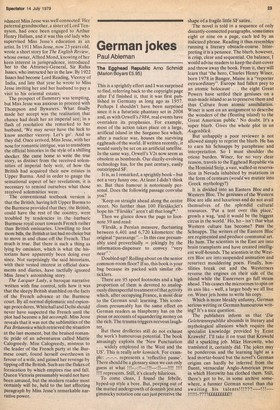German jokes
Paul Ableman
The Egghead Republic Arno Schmidt (Marion Boyars £5.95) This is a sprightly effort and I was surprised to find, referring back to the copyright page after I'd finished it, that it was first published in Germany as long ago as 1957. Perhaps I shouldn't have been surprised since it is a futuristic phantasy set in 2008 and, as with Orwell's 1984, real events have overtaken its prophesies. For example, most of the action takes place on a large, artificial island in the Sargasso Sea which, after a nuclear war, houses the surviving eggheads of the world. If written recently, it would surely be set on an artificial satellite. In the same way, Orwell's V2s now seem as obsolete as bombards. Our dizzily-evolving technology has, for the past century, easily outstripped SF.
It is, as I remarked, a sprightly book but not a very funny one. At least I didn't think so. But then humour is notoriously personal. Does the following passage convulse you?
'Keep on straight ahead along the centre street. No further than 100 Farsaks;let's hope his "Farsaks" aren't all that lone.'
Then we glance down the page to footnote 59 and read: ‘Farsak, a Persian measure, fluctuating between 6,401 and 6,720 kilometers: the original "parasange". In this case presumably used proverbially = jokingly by the information-dispenser to convey -very near".'
Doubled-up? Rolling about on the senior common-room floor? If so, this book is your bag because its packed with similar ribticklers.
There are 95 spoof footnotes and a high proportion of them is devoted to analogously disrespectful treatment of that activity which, after occupying France, is most dear to the German soul: learning. This iconoclasm presumably has the same effect on German readers as blasphemy has on the pious or accounts of squandering money on the rich. The trauma triggers nervous laughter.
But these drolleries still do not exhaust the work's humourous potential. The book amusingly exploits the 'New Punctuation . widely employed in the West and the US'. This is really sehr komisch. For example: .-.-.-. represents a 'reflective pause'. There should be a glossary since we can only guess at what !!!-.-:!!—:!!!--:!!—!!!! !!!! !!!! represents. Still, it's clearly hilarious.
To come clean, I found the febrile, hyped-up style a bore. But, peeping out of the matted undergrowth of donnish jest and gimmicky notation one can just perceive the shape of a fragile little SF satire.
The novel is told in a sequence of only distantly-connected paragraphs, sometimes eight or nine on a page, each led by an italicized phrase. Reading it thus resembles running a literary obstacle-course. Interpreting it is a penance. The blurb, however, is crisp, clear and sequential. On balance, I would advise readers to keep the dust-cover and throw away the book. From it, they will learn that 'the hero, Charles Henry Winer, born 1978 in Bangor, Maine is a "reporter extraordinary". Europe had fallen prey to an atomic holocaust . . . the eight Great Powers have settled their geniuses on a man-made island so as to preserve them and thus Culture from atomic annihilation. Winer is sent on an assignment to describe the wonders of the (floating island) to the Great American public.' No doubt. It's a super blurb. Gives the whole plot in an A ugenblick.
But unhappily a poor reviewer is not allowed simply to reprint the blurb. He has to earn his Schnapps by paraphrase and interpretation. So I must shoulder the otiose burden. Winer, for no very clear reason, travels to the Egghead Republic via the Hominid Strip, a vast, walled-in reservation in Nevada inhabited by mutations in the form of centaurs (would we mutate into Greek mythology?) It is divided into an Eastern Bloc and a Western Bloc. The geniuses of the Western Bloc are idle and luxurious and do not avail themselves of the splendid cultural resources. 'Put a tent over this place,' growls a wag, 'and it would be the biggest circus in the world.' Ho, ho isn't that what Western culture has become? Pass the Schnapps. The writers of the Eastern Bloc are regimented and produce communal art. Ho hum. The scientists in the East are into brain transplants and have created intelligent wolf-hounds. The scientists in the Western Bloc are into suspended animation and resurrect mouldering poets. Finally, hostilities break out and the Westerners reverse the engines on their side of the island while the Easterners go full steam ahead. This causes the microcosm to spin on its axis like well, a larger body we all live on. Winer jets home to write his copy.
Which is more bleakly unfunny, German serious writing or German humourous writing? It's a nice question.
The publishers inform us that Die Gelehrtenrepublike abounds in literary and mythological allusions which require the specialist knowledge provided by Ernst Krawehl'. I'll take it on trust that Krawehl did a sparkling job. Mike Horowitz, who translated it, certainly did. The jokes may be ponderous and the learning light as a lead mortar-board but the novel's German origins can hardly be inferred from the fluent, vernacular Anglo-American prose in which Horowitz has clothed them. Still, there's got to be, in some archive somewhere, a funnier German novel than this awaiting his talents!!!???---!!!--!!!!!!-??99ffffffffflt


































 Previous page
Previous page